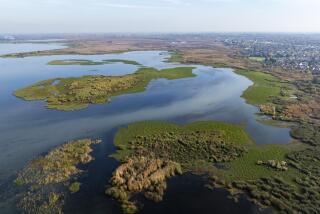Thousands march in Chile against Patagonia dam project
Thousands of people marched Friday in Santiago to protest a proposed hydroelectric project in southern Chile that critics say will spoil much of the pristine and biodiverse Patagonia region that is an increasingly popular eco-tourism destination.
The $3.2-billion HidroAysen project calls for construction of five dams on the Baker and Pascua rivers in the country’s Aysen region. It is expected to increase the electrical power supply by 15% when construction is completed in 2020.
The project has received less international publicity than the proposed Belo Monte power project on the Xingu River in Brazil’s Amazon, which would produce four times the energy. But critics say that HidroAysen could have devastating environmental effects on a largely untouched region that is home to many rare animal and plant species.
“As a Chilean, I’m worried about what is happening to our environment, how private companies are gaining concessions in the fine print, so I joined this protest movement,” said Emilia Rojas, a 31-year-old lawyer from Santiago who joined the 20,000 people gathered peacefully in the capital’s central Plaza Italia.
Favored by international travelers, the Aysen region is known for its rugged outcroppings, crystalline fjords and glaciers, and endangered species, including the huemul deer, which appears on Chile’s coat of arms.
“Destroying Chilean Patagonia is a cost that Chilean society is not prepared to pay,” said Patricio Rodrigo, executive secretary of Patagonia Without Dams. In an interview, he argued that the project’s main beneficiaries would be mining companies. He said they should secure their own power from wind, solar and geothermal sources.
The project presents a classic dilemma faced by many Latin American countries. Chileans find themselves having to choose between conserving natural beauty and biodiversity and creating infrastructure to boost economic development. The project would inundate about 15,000 acres in an area 1,000 miles south of Santiago, the capital.
Conservative President Sebastian Pinera is solidly behind the project and maintains that the dams are necessary to reduce the country’s dependence on imported energy.
Unlike Colombia, Brazil and Venezuela, which are largely self-sufficient in terms of energy, Chile imports 96% of its gasoline, diesel and fuel for electricity generation. The country is a leader in Latin America in the use of renewable energy sources, including hydro, wind and solar power.
But a recent poll commissioned by Fundacion Aysen Futuro, a regional planning group, found that 60% of those questioned in the Aysen region were against the project. The Roman Catholic bishop of Aysen, Luis Infanti de la Mora, wrote what he said was his first pastoral letter in eight years to tell congregants that he opposed the plan, saying it would have little local benefit and was going forward with inadequate local input.
Pinera, whose approval ratings have slipped sharply since the euphoria brought about by October’s rescue of 33 miners in the north, has countered that HidroAysen is an example of difficult and unpopular choices the country must make if it is to meet its energy needs in coming decades without running up a huge bill for imported oil and gas.
Protesters are seeking to rally opposition after the May 9 approval by regional authorities of an environmental impact report by the project’s developers, Enel-Endesa and Colbun, an important step forward for the project. Using Facebook and other social media, protesters have organized marches in various Chilean cities for this weekend.
Saturday morning, Chilean police expect 25,000 protesters outside the congressional building in Valparaiso, where Pinera is to give his state of the union speech.
Special correspondents Gutierrez reported from Santiago and Kraul from Bogota.
More to Read
Start your day right
Sign up for Essential California for news, features and recommendations from the L.A. Times and beyond in your inbox six days a week.
You may occasionally receive promotional content from the Los Angeles Times.






